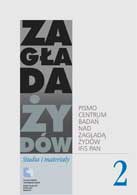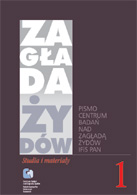Menu
- Strona główna
- Zespół Centrum
- Badania
- Publikacje
- Linki
- Kontakt
- Archiwum
- Zagłada Żydów. Studia i Materiały
pismo naukowe Centrum - Dalej jest noc - »Nieudana KOREKTA OBRAZU«
- Wybór źródeł
- EHRI PL
Aktualności
Otwarte Seminarium Naukowe Centrum -Karolina Panz, Zakopiańscy górale a Żydzi przed wojną, w czasie Zagłady i okresie tużpowojennym
Otwarte Seminarium Naukowe Karolina Panz Zakopiańscy górale a Żydzi przed wojną, w czasie Zagłady i okresie tużpowojennym Spotkanie odbędzie się w środę 18 lutego br. w sali 161 w Pałacu Staszica (ul. Nowy Świat 72) o godz. 11.00 Możliw...
Call for Articles - Zagłada Żydów. Studia i Materiały 2027
Call for Articles 2027 Call for Articles Szacunki i liczby w badaniach nad Zagładą: ograniczenia, zagrożenia i perspektywy W debatach o przebiegu Zagłady często pojawia się element sporu o szacunki i liczby w odniesieniu na przykład do ofiar obozów koncentracyj...
Otwarte Seminarium Naukowe Centrum: Sylweriusz B. Królak, Zmysłowe kontrasty getta warszawskiego – ucieleśnione doświadczenie przestrzeni Zagłady
Otwarte Seminarium Naukowe Sylweriusz B. Królak Zmysłowe kontrasty getta warszawskiego – ucieleśnione doświadczenie przestrzeni Zagłady Spotkanie odbędzie się w środę 21 stycznia br. w sali 161 w Pałacu Staszica (ul. Nowy Świat 72) o godz. 1...
Otwarte Seminarium Naukowe Centrum: Karolina Koprowska, Rozczarowanie i nadzieja – dwa dyskursy o przyszłości Żydów w powojennej Polsce
Otwarte Seminarium Naukowe Karolina Koprowska "Rozczarowanie i nadzieja – dwa dyskursy o przyszłości Żydów w powojennej Polsce" Spotkanie odbędzie się w środę 10 grudnia br. w sali 161 w Pałacu Staszica (ul. Nowy Świat 72) o godz. 11.00...
Premiera książki Karolin Panz pt. Chciałabym opowiedzieć jak zginęło miasto
10 grudnia o godz. 18.00 zapraszamy do Muzeum POLIN na premierę książki Karoliny Panz pt. "Chciałabym opowiedzieć jak zginęło miasto. Zagłada żydowskich mieszkańców Nowego Targu". Z autorką rozmawiać będzie Anna Bikont Postanowiłam, że odtworzę i opiszę h...
NEWSLETTER
 Chciałabym opowiedzieć jak zginęło miasto ...
Chciałabym opowiedzieć jak zginęło miasto ...
Zagłada Żydowskich mieszkańców Nowego Targu
Karolina Panz
Warszawa 2025
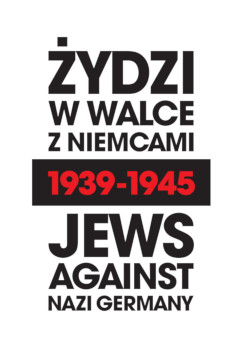
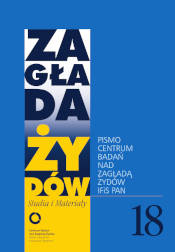 Zagłada Żydów.
Zagłada Żydów.
Studia i Materiały
nr 18, R. 2022
Warszawa 2022
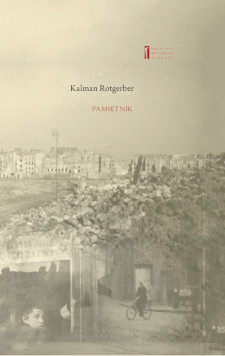 PAMIĘTNIK
PAMIĘTNIK
Kalman Rotgeber
oprac. Aleksandra Bańkowska, wstęp Jacek Leociak
Warszawa 2021
Zagłada Żydów.
Studia i Materiały
nr 17, R. 2021
Warszawa 2021
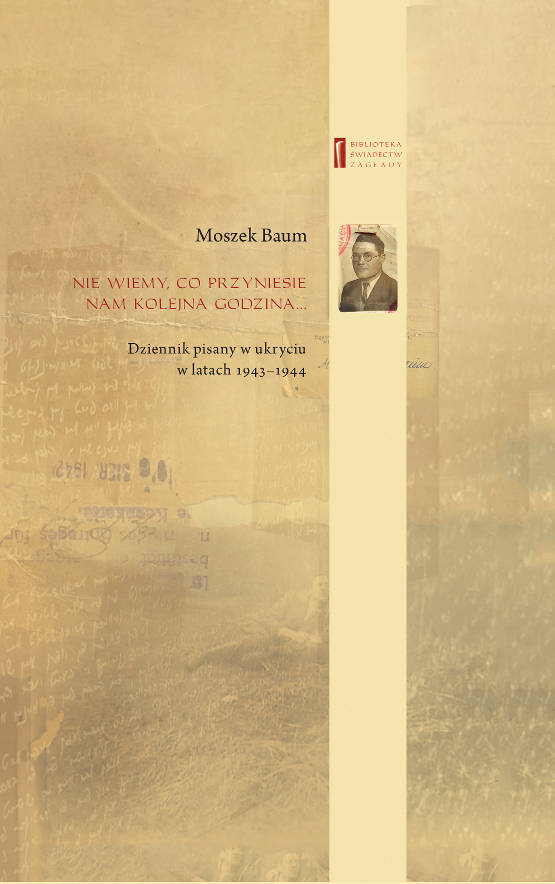 NIE WIEMY CO PRZYNIESIE NAM KOLEJNA GODZINA ...
NIE WIEMY CO PRZYNIESIE NAM KOLEJNA GODZINA ...
Dziennik pisany w ukryciu w latach 1943-1944
Moszek Baum, oprac. Barbara Engelking, tłum. z jidysz Monika Polit
Warszawa 2020
Zagłada Żydów.
Studia i Materiały
nr 16, R. 2020
Warszawa 2020
.jpg) Aryjskiego Żyda wspomnienia, łzy i myśli
Aryjskiego Żyda wspomnienia, łzy i myśli
Zapiski z okupacyjnej Warszawy
Sewek Okonowski, oprac. Marta Janczewska
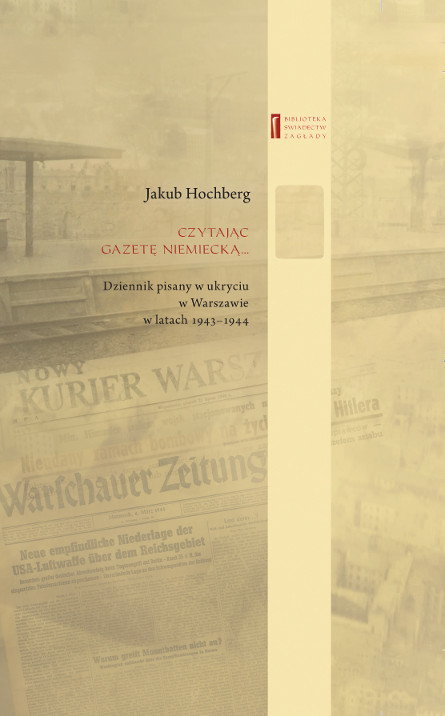 PISZĄCY TE SŁOWA JEST PRACOWNIKIEM
PISZĄCY TE SŁOWA JEST PRACOWNIKIEM
GETTOWEJ INSTYTUCJI ...
'z Dziennika' i inne pisma z łódzkiego getta
Józef Zelkowicz, tłum. z jidysz, oprac. i wstęp. Monika Polit
Warszawa 2019
CZYTAJĄC GAZETĘ NIEMIECKĄ ...
Dziennik pisany w ukryciu w Warszawie w latach 1943-1944
Jakub Hochberg, oprac. i wstępem opatrzyła Barbara Engelking
Warszawa 2019
Zagłada Żydów.
Studia i Materiały
nr 15, R. 2019
Warszawa 2019
.jpg) Zagłada Żydów.
Zagłada Żydów.
Studia i Materiały
nr 14, R. 2018
Warszawa 2018
 DALEJ JEST NOC. Losy Żydów w wybranych powiatach okupowanej Polski
DALEJ JEST NOC. Losy Żydów w wybranych powiatach okupowanej Polski
red. i wstęp Barbara Engelking, Jan Grabowski
Warszawa 2018
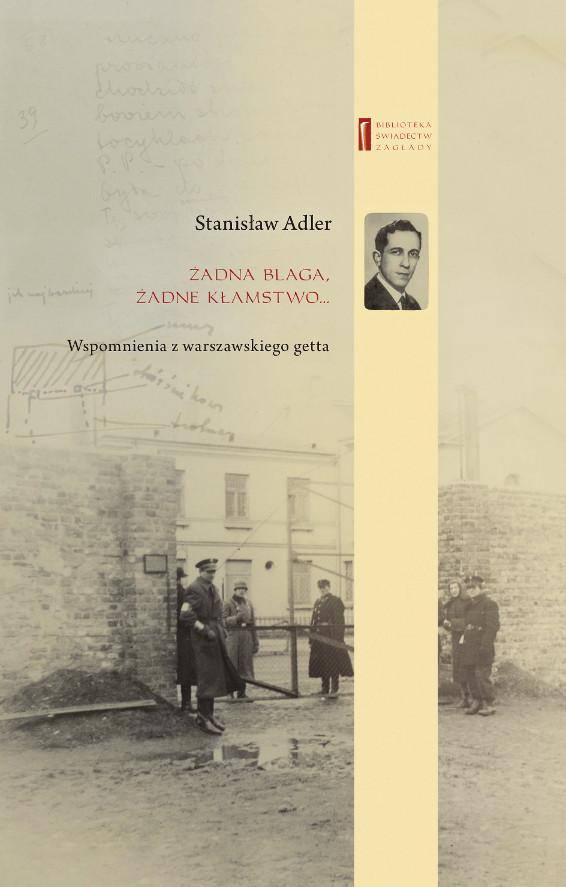 ŻADNA BLAGA, ŻADNE KŁAMSTWO ...
ŻADNA BLAGA, ŻADNE KŁAMSTWO ...
Wspomnienia z warszawskiego getta
Stanisław Adler, oprac. i wstępem opatrzyła Marta Janczewska
Warszawa 2018
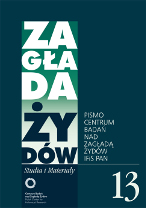 Zagłada Żydów.
Zagłada Żydów.
Studia i Materiały
nr 13, R. 2017
Warszawa 2017
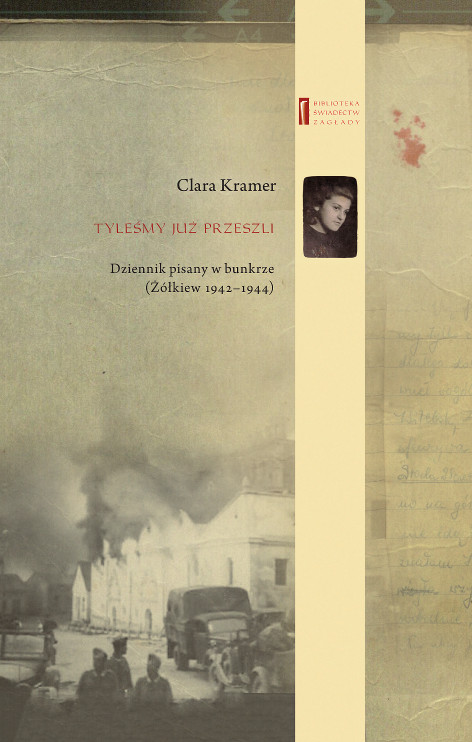 TYLEŚMY JUŻ PRZESZLI ...
TYLEŚMY JUŻ PRZESZLI ...
Dziennik pisany w bunkrze (Żółkiew 1942-1944)
Clara Kramer, oprac. i wstępem opatrzyła Anna Wylegała
Warszawa 2017
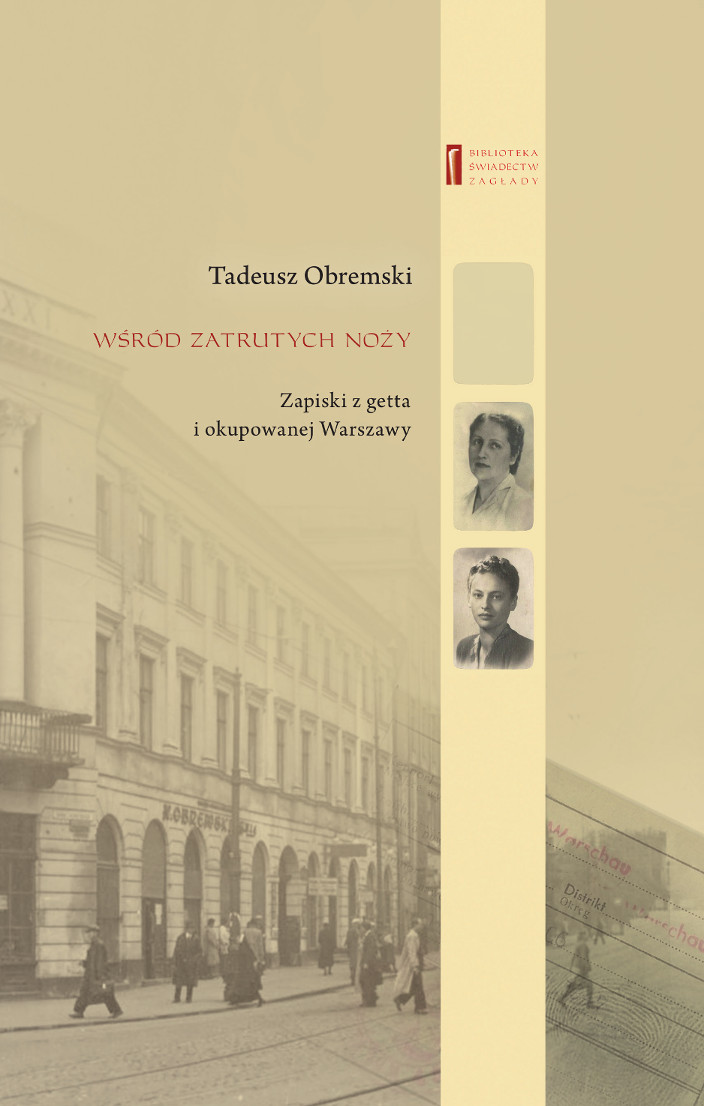 WŚRÓD ZATRUTYCH NOŻY ...
WŚRÓD ZATRUTYCH NOŻY ...
Zapiski z getta i okupowanej Warszawy
Tadeusz Obremski, oprac. i wstępem opatrzyła Agnieszka Haska
Warszawa 2017
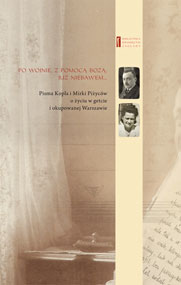 PO WOJNIE, Z POMOCĄ BOŻĄ, JUŻ NIEBAWEM ...
PO WOJNIE, Z POMOCĄ BOŻĄ, JUŻ NIEBAWEM ...
Pisma Kopla i Mirki Piżyców o życiu w getcie i okupowanej Warszawie
oprac. i wstępem opatrzyła Barbara Engelking i Havi Dreifuss
Warszawa 2017
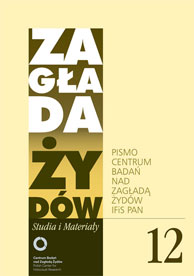 Zagłada Żydów.
Zagłada Żydów.
Studia i Materiały
nr 12, R. 2016
Warszawa 2016
.jpg) SNY CHOCIAŻ MAMY WSPANIAŁE ...
SNY CHOCIAŻ MAMY WSPANIAŁE ...
Okupacyjne dzienniki Żydów z okolic Mińska Mazowieckiego
oprac. i wstępem opatrzyła Barbara Engelking
Warszawa 2016
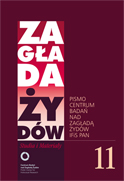 Zagłada Żydów.
Zagłada Żydów.
Studia i Materiały
nr 11, R. 2015
Warszawa 2015
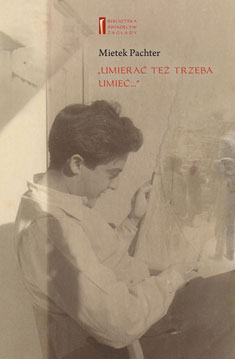 Mietek Pachter
Mietek Pachter
UMIERAĆ TEŻ TRZEBA UMIEĆ ...
oprac. B. Engelking
Warszawa 2015
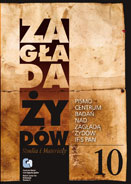 Zagłada Żydów.
Zagłada Żydów.
Studia i Materiały
nr 10, t. I-II, R. 2014
Warszawa 2015
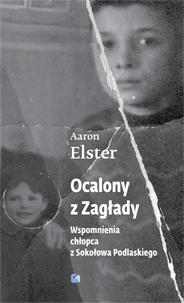 OCALONY Z ZAGŁADY
OCALONY Z ZAGŁADY
Wspomnienia chłopca z Sokołowa Podlaskiego
tłum. Elżbieta Olender-Dmowska
red .B. Engelking i J. Grabowski
Warszawa 2014
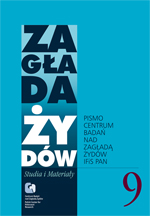 ZAGŁADA ŻYDÓW. STUDIA I MATERIAŁY
ZAGŁADA ŻYDÓW. STUDIA I MATERIAŁY
vol. 9 R. 2013
Pismo Centrum Badań nad Zagładą Żydów IFiS PAN
Warszawa 2013
 ... TĘSKNOTA NACHODZI NAS JAK CIĘŻKA CHOROBA ...
... TĘSKNOTA NACHODZI NAS JAK CIĘŻKA CHOROBA ...
Korespondencja wojenna rodziny Finkelsztejnów, 1939-1941
oprac. i wstępem opatrzyła Ewa Koźmińska-Frejlak
Warszawa 2012
Raul Hilberg
PAMIĘĆ I POLITYKA. Droga historyka Zagłady
tłum. Jerzy Giebułtowski
Warszawa 2012
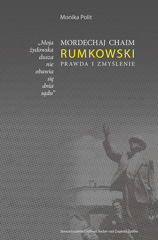 Monika Polit
Monika Polit
"Moja żydowska dusza nie obawia się dnia sądu."
Mordechaj Chaim Rumkowski. Prawda i zmyślenie
Warszawa 2012
.jpg) Dariusz Libionka i Laurence Weinbaum
Dariusz Libionka i Laurence Weinbaum
Bohaterowie, hochsztaplerzy, opisywacze. Wokół Żydowskiego Związku Wojskowego
Warszawa 2011
.jpg) Zagłada Żydów.
Zagłada Żydów.
Studia i Materiały
R. 2011, nr. 7; Warszawa 2011
.jpg) Jan Grabowski
Jan Grabowski
JUDENJAGD. Polowanie na Żydów 1942.1945.
Studium dziejów pewnego powiatu
Warszawa 2011
.jpg) Stanisław Gombiński (Jan Mawult)
Stanisław Gombiński (Jan Mawult)
Wspomnienia policjanta z warszawskiego getta
oprac. i wstęp Marta Janczewska
Warszawa 2010
Holocaust Studies and Materials
Journal of the Polish Center for Holocaust Research
Warssaw 2010
.jpg) Żydów łamiących prawo należy karać śmiercią!
Żydów łamiących prawo należy karać śmiercią!
"Przestępczość" Żydów w Warszawie, 1939-1942
B. Engelking, J. Grabowski
Warszawa 2010
Zagłada Żydów.
Studia i Materiały
R. 2010, nr. 6; Warszawa 2010
Wybór źródeł do nauczania o zagładzie Żydów
Ćwiczenia ze źródłami
red. A. Skibińska, R. Szuchta
Warszawa 2010
.jpg) W Imię Boże!
W Imię Boże!
Cecylia Gruft
oprac. i wstęp Łukasz Biedka
Warszawa 2009
Zagłada Żydów.
Studia i Materiały
R. 2009, nr. 5; Warszawa 2009
.jpg) Żydzi w powstańczej Warszawie
Żydzi w powstańczej Warszawie
Barbara Engelking i Dariusz Libionka
Warszawa 2009
 Reportaże z warszawskiego getta
Reportaże z warszawskiego getta
Perec Opoczyński
Warszawa 2009
 Notatnik
Notatnik
Szmul Rozensztajn
Warszawa 2008
.jpg) Holocaust
Holocaust
Studies and Materials.
English edition
2008, vol. 1; Warsaw 2008
.jpg) Źródła do badań nad zagładą Żydów na okupowanych ziemiach polskich
Źródła do badań nad zagładą Żydów na okupowanych ziemiach polskich
Przewodnik archiwalno-bibliograficzny
Alina Skibińska, wsp. Marta Janczewska, Dariusz Libionka, Witold Mędykowski, Jacek Andrzej Młynarczyk, Jakub Petelewicz, Monika Polit
Warszawa 2007
Zagłada Żydów. Studia i Materiały
R. 2007, nr. 3; Warszawa 2007
Prowincja noc.
Życie i zagłada Żydów w dystrykcie warszawskim
Warszawa 2007
.jpg) Utajone miasto.
Utajone miasto.
Żydzi po 'aryjskiej' stronie Warszawy [1941-1944]
Gunnar S Paulsson
Kraków 2007
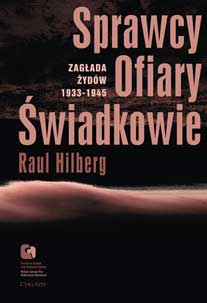 Sprawcy, Ofiary, Świadkowie.
Sprawcy, Ofiary, Świadkowie.
Zagłada Żydów, 1933-1944
Raul Hilberg
Warszawa 2007
Zagłada Żydów. Studia i Materiały
R. 2006, nr. 2; Warszawa 2006
"Jestem Żydem, chcę wejść!".
Hotel Polski w Warszawie, 1943.
Agnieszka Haska
Warszawa 2006
Zagłada Żydów. Studia i Materiały
R. 2005, nr. 1; Warszawa 2005
.jpg) 'Ja tego Żyda znam!'
'Ja tego Żyda znam!'
Szantażowanie Żydów w Warszawie, 1939-1943.
Jan Grabowski
Warszawa 2004
 'Szanowny panie Gistapo!'
'Szanowny panie Gistapo!'
Donosy do władz niemieckich w Warszawie i okolichach, 1940-1941
Barbara Engelking, Warszawa 2003
aaa
ul. Nowy Świat 72, 00-330 Warszawa;
Palac Staszica pok. 120
e-mail: centrum@holocaustresearch.pl
Jan Grabowski w University World News o sprawie odebrania orderu J.T. Grossowi
Jan Grabowski w University World News o sprawie odebrania orderu J.T. Grossowi
18.02.2016 13:10:18
Artykuł Prof. Jan Grabowskiego opublikowany na łamach University World News podnoszący temat kroków podejmowanych przez kancelarię Prezydenta RP w sprawie odebrania Janowi Tomaszowi Groosowi Krzyża Kawalerskiego Orderu Zasługi RP
‘Patriotic’ move threatens academic freedom
Jan Grabowski
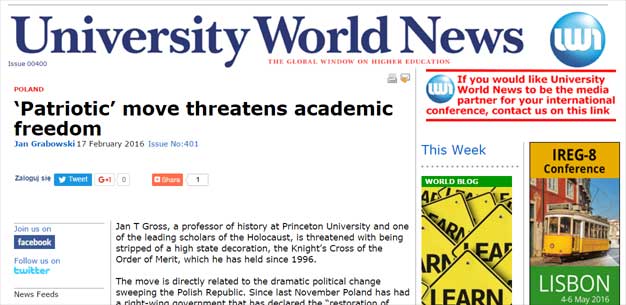 Jan T Gross, a professor of history at Princeton University and one of the leading scholars of the Holocaust, is threatened with being stripped of a high state decoration, the Knight’s Cross of the Order of Merit, which he has held since 1996.
Jan T Gross, a professor of history at Princeton University and one of the leading scholars of the Holocaust, is threatened with being stripped of a high state decoration, the Knight’s Cross of the Order of Merit, which he has held since 1996.
The move is directly related to the dramatic political change sweeping the Polish Republic. Since last November Poland has had a right-wing government that has declared the “restoration of Polish national pride” as one of its fundamental goals and the centrepiece of its political project.
According to the Polish authorities, the state will henceforth put much more emphasis on ‘patriotic’ education, which will stress heroic periods and glorious themes in national history.
A more critical examination of the less ‘positive’ aspects of our past is definitely not on the agenda for the ruling Law and Justice party, known as PiS. And in the recent history of Poland no subject has proved to be more charged with emotions than the role of Polish society in the killing of Polish Jews during the Holocaust and no scholar more involved in this kind of research than Jan T Gross.
Ever since 2001 when Gross published his seminal Neighbors – a story of Jedwabne, a small town whose Polish inhabitants, in 1941, brutalised and later burned alive hundreds of their Jewish neighbours – Poles have been forced to look at their own past in a different light.
Gross went on to publish two more books: one discussed the 1946 pogrom in Kielce, where a Polish mob driven into a frenzy by tales of blood libel, massacred 40 Jewish men, women and children, survivors of the Holocaust. The last book, published in 2011, focused on the massive theft of Jewish property perpetrated by locals during the Holocaust and after the war.
Sanitised view of the past
Unsurprisingly, works by the American scholar have raised fury among nationalists for whom Gross has become the most visible threat to their idealised and sanitised vision of the past.
It is not surprising, therefore, that Andrzej Duda, the new president of Poland, initiated a procedure to strip Jan T Gross of the Order of Merit, a high Polish decoration which was given to the American professor for his past opposition to the communist regime.
The gesture, however petty and immature, is meant as a clear warning to open-minded people who are vocal in their criticism of the present government. It is a sign of the new 'historical policy' in which the state dictates, on the one hand, what kind of the past has the official seal of approval and, on the other hand, what kind of research constitutes an act of national treason.
What view of the past president Duda wants was made clear during the presidential campaign last year. In the opening statement of the first presidential debate Duda accused the outgoing president Bronislaw Komorowski of having “apologised for Jedwabne”.
According to Duda, there is nothing in their history that the Poles have to apologise for and, once in office, he said he would initiate an energetic campaign to “reinforce national pride”. Judging by official declarations concerning Professor Gross, Duda has been true to his word.
Whether Jan T Gross’ decoration is taken away from him or not is – in the end – of little relevance. The fact that the government and the president of a large European country are seriously contemplating such a gesture is a different matter.
Even more disturbing is the news of new legislation moving at a rapid pace through the Polish parliament. According to Patryk Jaki, deputy minister of justice, the new law will impose a sentence of five years in jail for people who “blame the Polish nation for Nazi or Stalinist crimes”.
The chilling effect of these words on scholarly pursuits and on the independence of historical research in Poland will be obvious and immediate.


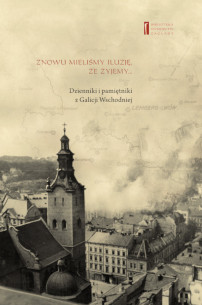
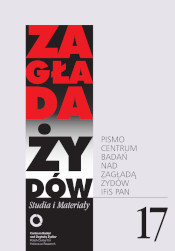
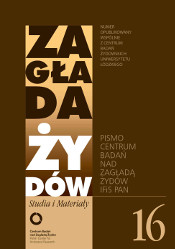
.jpg)
.jpg)
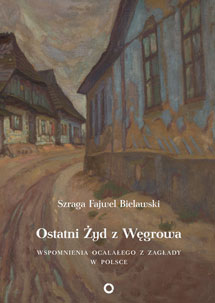
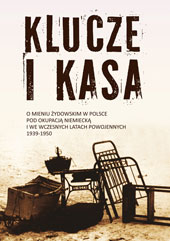
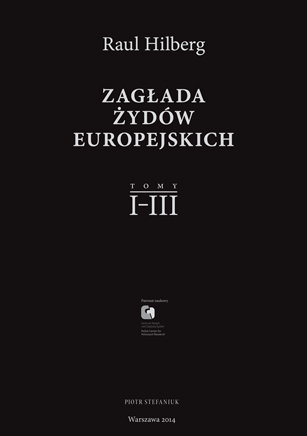
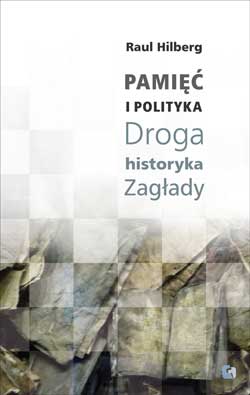
.jpg)
.jpg)
.jpg)
.jpg)
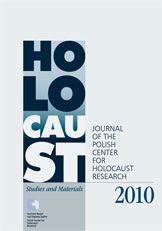

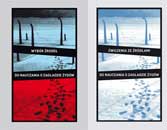
.jpg)
.jpg)
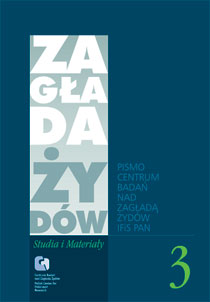
.jpg)
